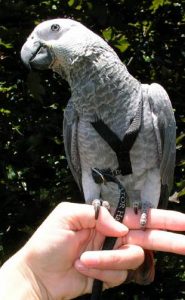 Everyone has heard about the use of highly trained dogs as “service animals” meant to assist people with disabilities. These dogs have a long history of intense training in order to provide a wealth of specialty services. Such services allow for a disabled individual to navigate the world in ways that their disability might not have naturally allowed them to do in the first place. With these animals, a sense of deserved autonomy affords the disabled person a feeling of belonging to a world that is heavily slanted toward the unrestrained use of all senses. Therefore, it goes without saying that benefits of these animals provide not only personal safety, but also tends to the emotional improvement of disabled individuals. For many years, one of the uses of service dogs has been to soothe people suffering from Post-Traumatic Stress Disorder (PTSD), calming them during periods of anxiety.
Everyone has heard about the use of highly trained dogs as “service animals” meant to assist people with disabilities. These dogs have a long history of intense training in order to provide a wealth of specialty services. Such services allow for a disabled individual to navigate the world in ways that their disability might not have naturally allowed them to do in the first place. With these animals, a sense of deserved autonomy affords the disabled person a feeling of belonging to a world that is heavily slanted toward the unrestrained use of all senses. Therefore, it goes without saying that benefits of these animals provide not only personal safety, but also tends to the emotional improvement of disabled individuals. For many years, one of the uses of service dogs has been to soothe people suffering from Post-Traumatic Stress Disorder (PTSD), calming them during periods of anxiety.
Over the last few years, Parrots are increasingly being used as such animals albeit with a different approach. With innate abilities to mimic human voice and acquiring phrases to use, the parrot is able to provide a calming influence over those suffering from various levels of anxieties. Such anxieties can be brought on by autism, bi-polar disorders, the previously mentioned PTSD problems that can cover a wide range of causes, and an even wider spectrum of various psychotic disorders.
Not long ago, an incident occurred in a Kennewick, WA, WinCo grocery store where a man with a parrot was asked to leave the store. In this case, the man used his pet parrot as a service animal to help him manage his anxieties. While the man had a doctor’s approval, the ADA (Americans with Disabilities Act) only has provisions set for the use of dogs and small horses. As a result, the man had to leave the store with his parrot on his shoulder.
The parrot had been successfully used to soothe the man’s anxieties enabling him to merge more seamlessly with society. The bird, Kai, has been with the man for over a year and has been credited with changing the disabled man considerably, making him feel more “normal.”
In the UK, an autistic boy has derived a calming benefit from a caique parrot used as an emotional support animal. When the boy discovered that there were depressed parrots that self-harm by plucking their feathers, he tapped into the love he has for his parrot, Petrie, and sheared his long locks in exchange for donations. At this writing, the boy has raised more than $750 dollars, a goal that has exceeded his original intent by over 400%.
There is a growing use of parrots (and other creatures) as Emotional Support Animals (ESA). In fact, many of them can be registered as such. And while the ADA only recognizes the use of dogs and miniature horses, there is hope that one day, the Justice Department agency can recognize the use of parrots as an effective and necessary calming influence on anxiety sufferers. As the realization that a disability is not always a visually seen one becomes more solidified, laws can change to properly accommodate all in need.
Parrots are known to be intuitively aware of the human emotion. They can sense when their owner becomes angry, when they become stressed and begin to grow tense as a result. By the trained use of certain phrases that can soothe an increasingly agitated individual, an ESA parrot can provide an emotional assistance that can be most helpful.
In Tulsa, OK, there is a therapy service owned by two dedicated bird lovers who have fully recognized the therapeutic potential of trainable exotic birds. The assistive service is called, interestingly, On A Wing And A Prayer. The program is a large part of the established Gifted Wings Ministry. While the benefit started more than eleven years ago with a pair of parakeets, the service now uses more than 65 birds to provide calming and restorative benefits to needy people with disabilities. With birds that range from cockatoos and cockatiels, a macaw, an assortment of parakeets, an African grey parrot, Amazon parrots, and other beautiful birds, the service can lay claim to many therapeutic values these creatures have already provided. There is a story recounted of a non-speaking patient suffering from dementia, who, after petting a cockatiel began to speak again.
There are increasingly more stories involving the uses of parrots as emotional support service animals. Soon, the service of parrots and other birds may gain the respect and value that it deserves.





